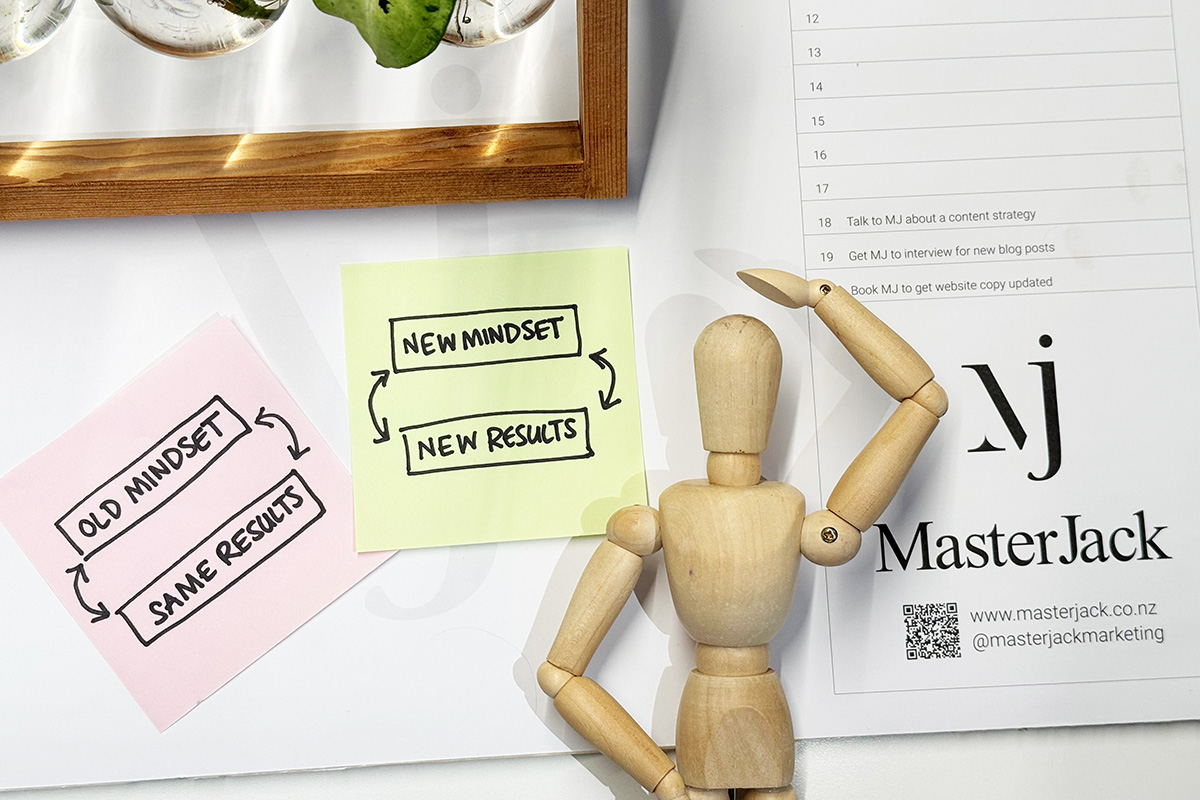“We just need to survive until 2025.”
If you’ve thought, heard, or said this recently, you’re not alone. With last year’s property market challenges and the uncertainty that came with government changes, many New Zealand businesses are stuck in survival mode. But here’s the thing – while you’re focused on just keeping your head above water, you might be missing the opportunities floating right past you.

Let’s talk about Sarah and Mike (not their real names)—both own consulting businesses in Auckland. For ages, they saw each other as competitors and had them on each other’s radars (you know how you follow your competitor’s socials to see what they are doing). They carefully guarded their client lists, who they were schmoozing with and who they were wooing. Each was doing okay, but both felt like they were constantly hustling just to maintain their position. Classic fixed mindset: protect what you have, view everything as a competition, see success as a finite resource.
Then something interesting happened. They ended up seated next to each other at a business conference. Over coffee, they realised they had complementary skills. Sarah excelled at strategy, Mike at implementation. Instead of competing, they started referring clients to each other. Their businesses changed from surviving to thriving.
This is shifting from a fixed mindset to a growth mindset. But wait, there’s more. I want to talk about an abundance mindset – which is another step up in the ladder to success.
A fixed mindset in business looks like:
- Viewing every other business as competition
- Hoarding knowledge and connections
- Making decisions from a place of fear
- Focusing on protecting rather than growing
- Seeing the economic pie as fixed in size
Sound familiar? It’s a natural response to uncertainty. But it’s also a recipe for stagnation. The growth mindset is your stepping stone out of survival mode:
- Seeing challenges as opportunities
- Being willing to learn and adapt
- Taking calculated risks
- Investing in development
- Looking for new ways to do things
This is where many businesses stop. A growth mindset is good, but there’s another level which is where the magic happens – abundance mindset:
- Recognising that success isn’t a zero-sum game
- Understanding that sharing knowledge grows the whole industry
- Embracing co-opetition (collaborative competition)
- Viewing other businesses as potential partners
- Seeing endless possibilities for creation and innovation
We’re seeing this play out in interesting ways across New Zealand. Remember Sarah and Mike? Their story isn’t unique. We’re watching accountants partner with business coaches, lawyers collaborate with mediators, and retailers share shipping costs. It’s so smart, and I wonder why we didn’t think of this before!
MasterJack has been on this journey for a while now. Whilst we could be everything to everyone and provide services in branding, designs, websites, socials, etc, we have found a niche that works for us and provides work for our partners who do specialise in such things. We often remain the point of contact for our clients and can manage the process that brings in people who are exceptionally good at what they do.
How do you start this, though – it’s all well and good to start thinking that you’ll look for the next opportunity, but I can attest to the fact that it starts with the mind.
- Audit your thoughts
a. Notice when you’re making decisions from fear
b. Challenge your competitive assumptions
c. Question whether protecting is actually serving you - Start small
a. Identify one potential collaboration opportunity
b. Share some knowledge without expecting immediate return
c. Join or create a business support group - Look for win-win opportunities
a. Map out your business ecosystem
b. Identify complementary businesses
c. Think about how you could create value together - Build trust gradually
a. Start with small collaborations
b. Be transparent about your intentions
c. Deliver on your promises - Measure different things. Instead of just tracking what you get, start measuring:
a. Knowledge shared
b. Connections made
c. Opportunities created
d. Value added to your industry
When you shift from a survival mindset to an abundance mindset, something interesting happens. Your content becomes more valuable because you share real insights, not just safe generalisations. Your network grows because you’re connecting, not competing. Your expertise deepens because you’re learning from others, not just your experience.
This mindset shift changes how you show up in business. And here’s the really interesting part – when you operate from abundance, you become more attractive to clients. They can feel the difference between someone who’s desperately protecting their patch and someone who’s confidently creating value.
As we navigate 2025, maybe it’s time to shift the narrative from survival to creation. Yes, the challenges are real. Yes, the market is uncertain. But maybe that’s exactly why we need to think differently.
Want to explore how this mindset shift could work in your business? Let’s talk about turning your expertise into content that creates value for your whole industry. Because in our experience, the businesses that thrive aren’t the ones who hoard their knowledge – they’re the ones who share it.
